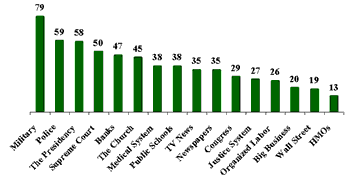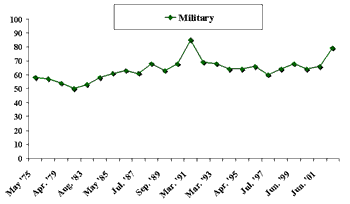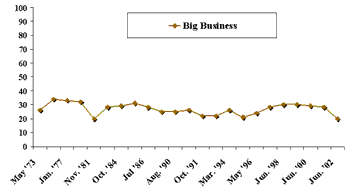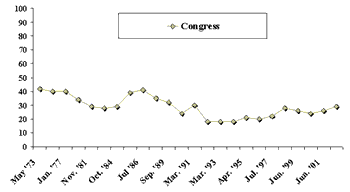GALLUP NEWS SERVICE
PRINCETON, NJ -- Americans' confidence in organized religion and big business has fallen significantly over the last year, while their confidence in the military and the presidency has increased. Overall, the military, the police, the presidency, the U.S. Supreme Court and banks are the five institutions out of the 16 tested in which the American people have the highest degree of confidence. The institutions that have earned the least amount of confidence from Americans include HMOs, Wall Street, big business, organized labor and the criminal justice system.
Gallup has asked Americans to rate their confidence in selected institutions since 1973. Here are the basic results for this year's measures, based on surveying conducted June 21-23:
Now I am going to read you a list of institutions in American society. Please tell me how much confidence you, yourself, have in each one -- a great deal, quite a lot, some, or very little? First, ... Next, [RANDOM ORDER].
|
|
|
|
|
|
|
|
||
|
% |
% |
% |
% |
% |
% |
|||
|
The military |
43 |
36 |
16 |
5 |
* |
* |
||
|
The police |
28 |
31 |
31 |
9 |
1 |
* |
||
|
The presidency |
29 |
29 |
29 |
11 |
1 |
1 |
||
|
The U.S. Supreme Court |
22 |
28 |
35 |
13 |
* |
2 |
||
|
Banks |
17 |
30 |
39 |
12 |
1 |
1 |
||
|
The church or organized religion |
26 |
19 |
32 |
18 |
3 |
2 |
||
|
The medical system |
15 |
23 |
42 |
18 |
1 |
1 |
||
|
The public schools |
12 |
26 |
41 |
18 |
2 |
1 |
||
|
Television news |
14 |
21 |
43 |
19 |
2 |
1 |
||
|
Newspapers |
12 |
23 |
47 |
16 |
1 |
1 |
||
|
Congress |
9 |
20 |
53 |
16 |
1 |
1 |
||
|
The criminal justice system |
9 |
18 |
46 |
24 |
2 |
1 |
||
|
Organized labor |
11 |
15 |
48 |
21 |
2 |
3 |
||
|
Big business |
7 |
13 |
47 |
29 |
3 |
1 |
||
|
Wall Street |
8 |
11 |
52 |
21 |
3 |
5 |
||
|
Health Maintenance Organizations, HMOs |
5 |
8 |
36 |
42 |
5 |
4 |
||
|
* Less than 0.5% |
||||||||
|
(vol.) Volunteered response |
||||||||
The graph below represents the rank order of institutions, from top to bottom, based on the percentage of Americans saying they have "a great deal" and "quite a lot" of confidence in each:
| Confidence in Institutions % Great Deal/Quite a Lot |
 |
| June 21-23, 2002 |
The Military
The military has jumped to a much more substantial edge as the top institution tested than has been the case in recent years, with a 20-percentage-point lead over the institution that was rated next highest -- the police, at 59%.
| Confidence in Institutions % Great Deal/Quite a Lot |
 |
The public's confidence in the military jumped 13 points this year. Gallup saw this same type of jump in March 1991, just at the conclusion of the Persian Gulf War, when confidence in the military went up 17 points -- from 68% to 85%. The 85% reading in 1991 remains the all-time high point for confidence in the military. Confidence in the military quickly fell back to 69% by October 1991, however, and remained in the 60% range through the 1990s and in 2000 and 2001. This year, of course, the aftermath of Sept. 11 has led the military to involvement in the war on terrorism.
Gallup was not measuring confidence in institutions in this way during other major periods of military involvement, such as World War II and the Korean and Vietnam Wars, but it is worth noting that the military has generally had high scores since 1975. In fact, 58% of Americans said they had a great deal or quite a lot of confidence in the military in 1975, just a few years after the U.S. military had left Vietnam. The low point for confidence in the military came in 1981, at 50%.
Big Business
It certainly comes as no surprise to find that confidence in big business dropped this year, from an already low 28% last year to 20%.
| Confidence in Institutions % Great Deal/Quite a Lot |
 |
This puts big business as third from the bottom on this year's list, essentially tied with "Wall Street," at 19%, and slightly ahead of HMOs, at 13%. The percentage who say they have very little or no confidence in big business -- 32% -- is the second highest for any institution tested, behind only the 47% who have very little or no confidence in HMOs.
A look at the trend on confidence in big business underscores the conclusion that its low position in the minds of Americans this year, although down, is not drastically different from previous years. The highest confidence rating given to big business since 1973 is 34% in 1975. Even in the boom years of 1999 and 2000, when business in general was riding high and positive portraits of business CEOs filled the papers and magazines, only 30% and 29% of Americans, respectively, said they had a great deal or quite a lot of confidence in big business.
The use of the adjective "big" in front of business, which Gallup included when this trend on confidence in institutions began in 1973, is no doubt one factor in the low rating. In 1997 and 1998, Gallup also tested "small business" and found that it scored 26 to 35 percentage points higher than "big" business did. In 1997, the percentage of Americans with a great deal or quite a lot of confidence in big business was 28% while confidence in small business was 63%. The same ratio in 1998 was 30% big business to 56% small business.
The Church or Organized Religion
The biggest change in this year's confidence ratings is the sharp drop in the percentage of Americans who have a great deal or quite a lot of confidence in the church or organized religion, which fell from 60% last year to 45% this year. The current 45% reading is the lowest in Gallup Poll history for the church/organized religion. The previous low point came in 1989, at 52%. At that time, scandals involving televangelists undermined Americans' confidence in religion. Prior to that point, the church/organized religion had generally scored in the 60%+ range, and for a number of years -- from 1973 to the mid-1980s -- was the institution with the highest ratings.
There is little question that the sex abuse scandal rocking the Catholic Church is the main cause of the drop-off in confidence this year. This year's data show that 42% of Catholics and 59% of Protestants have a great deal/quite a lot of confidence in the church/organized religion. A 1991 Gallup poll showed essentially no difference in Catholics' and Protestants' ratings of confidence in organized religion.
The Presidency
The 58% confidence level in the presidency this year is the highest for that institution since March 1991, the first time it was included on the list. In that survey, completed just as the Persian Gulf War was coming to a successful conclusion, 72% of Americans said they had a great deal/quite a lot of confidence in the presidency. (The elder) President George Bush's job approval ratings at that point were in the high 80% range.
This year, some nine months after Sept. 11, President George W. Bush's job approval ratings are in the mid-to-low 70% range.
It is worth noting that confidence in the presidency was not notably damaged in 1998 and 1999 in the aftermath of the Bill Clinton impeachment scandal, in line with the fact that Clinton's job approval ratings also did not suffer during that time, even as he was being impeached by the House and tried in the U.S. Senate.
Other Institutions
None of the other 12 institutions measured this year have significantly gained or lost confidence from the American public.
Some insights:
- "Wall Street" was included this year in order to capture the public's feelings about the equities and securities system. The results show, as noted, that Wall Street engenders very little confidence at this time.
- Of the three branches of government, the presidency scores highest, with 58% expressing a great deal/quite a lot of confidence in it, followed by the Supreme Court, at 50%, and Congress, at 29%.
- The confidence levels in Congress in this survey are up just 3 percentage points from last year, in line with the finding that job approval for Congress has fallen back to roughly where it was prior to Sept. 11 (after having risen to as high as 84% last fall). Still, Congress over the last five years has received slightly higher confidence levels than it did during the period from 1991 to 1997, when ratings were in the 18% to 22% range. Prior to that, however, Congress had received ratings as high as 41% in 1986, and 42% in 1973.
| Confidence in Institutions % Great Deal/Quite a Lot |
 |
There is no difference in the levels of confidence given to newspapers as opposed to TV news; both are at 35%. In 1993, when Gallup first started asking about television news, it had higher confidence levels than did newspapers.
Survey Methods
These results are based on telephone interviews with a randomly selected national sample of 1,020 adults, 18 years and older, conducted June 21-23, 2002. For results based on this sample, one can say with 95 percent confidence that the maximum error attributable to sampling and other random effects is plus or minus 3 percentage points. In addition to sampling error, question wording and practical difficulties in conducting surveys can introduce error or bias into the findings of public opinion polls.
